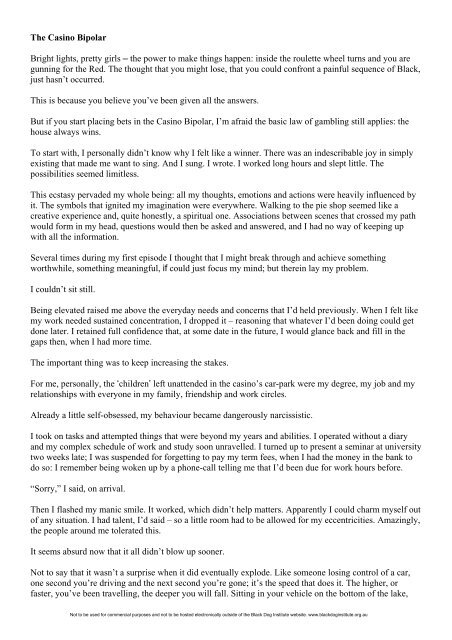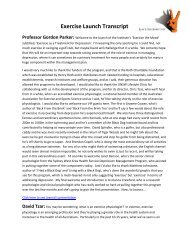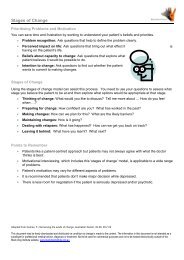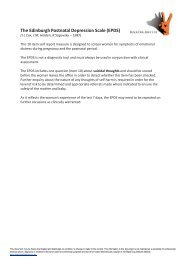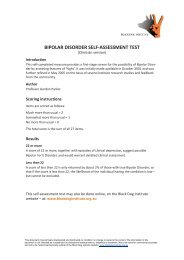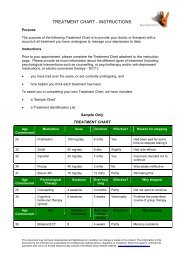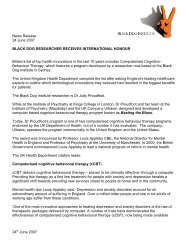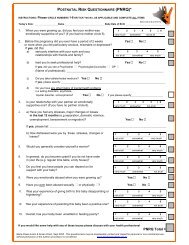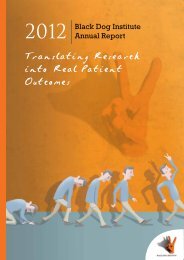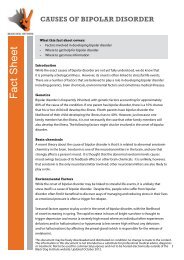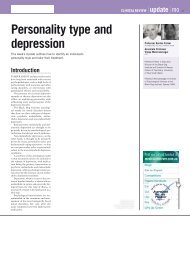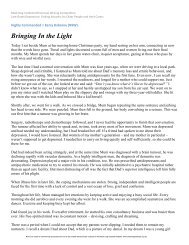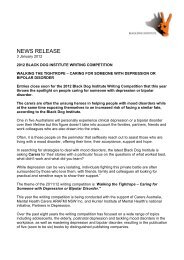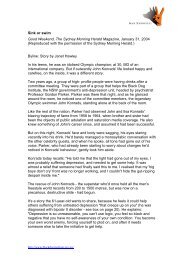The Casino Bipolar - Black Dog Institute
The Casino Bipolar - Black Dog Institute
The Casino Bipolar - Black Dog Institute
Create successful ePaper yourself
Turn your PDF publications into a flip-book with our unique Google optimized e-Paper software.
<strong>The</strong> <strong>Casino</strong> <strong>Bipolar</strong><br />
Bright lights, pretty girls – the power to make things happen: inside the roulette wheel turns and you are<br />
gunning for the Red. <strong>The</strong> thought that you might lose, that you could confront a painful sequence of <strong>Black</strong>,<br />
just hasn’t occurred.<br />
This is because you believe you’ve been given all the answers.<br />
But if you start placing bets in the <strong>Casino</strong> <strong>Bipolar</strong>, I’m afraid the basic law of gambling still applies: the<br />
house always wins.<br />
To start with, I personally didn’t know why I felt like a winner. <strong>The</strong>re was an indescribable joy in simply<br />
existing that made me want to sing. And I sung. I wrote. I worked long hours and slept little. <strong>The</strong><br />
possibilities seemed limitless.<br />
This ecstasy pervaded my whole being: all my thoughts, emotions and actions were heavily influenced by<br />
it. <strong>The</strong> symbols that ignited my imagination were everywhere. Walking to the pie shop seemed like a<br />
creative experience and, quite honestly, a spiritual one. Associations between scenes that crossed my path<br />
would form in my head, questions would then be asked and answered, and I had no way of keeping up<br />
with all the information.<br />
Several times during my first episode I thought that I might break through and achieve something<br />
worthwhile, something meaningful, if could just focus my mind; but therein lay my problem.<br />
I couldn’t sit still.<br />
Being elevated raised me above the everyday needs and concerns that I’d held previously. When I felt like<br />
my work needed sustained concentration, I dropped it – reasoning that whatever I’d been doing could get<br />
done later. I retained full confidence that, at some date in the future, I would glance back and fill in the<br />
gaps then, when I had more time.<br />
<strong>The</strong> important thing was to keep increasing the stakes.<br />
For me, personally, the ‘children’ left unattended in the casino’s car-park were my degree, my job and my<br />
relationships with everyone in my family, friendship and work circles.<br />
Already a little self-obsessed, my behaviour became dangerously narcissistic.<br />
I took on tasks and attempted things that were beyond my years and abilities. I operated without a diary<br />
and my complex schedule of work and study soon unravelled. I turned up to present a seminar at university<br />
two weeks late; I was suspended for forgetting to pay my term fees, when I had the money in the bank to<br />
do so: I remember being woken up by a phone-call telling me that I’d been due for work hours before.<br />
“Sorry,” I said, on arrival.<br />
<strong>The</strong>n I flashed my manic smile. It worked, which didn’t help matters. Apparently I could charm myself out<br />
of any situation. I had talent, I’d said – so a little room had to be allowed for my eccentricities. Amazingly,<br />
the people around me tolerated this.<br />
It seems absurd now that it all didn’t blow up sooner.<br />
Not to say that it wasn’t a surprise when it did eventually explode. Like someone losing control of a car,<br />
one second you’re driving and the next second you’re gone; it’s the speed that does it. <strong>The</strong> higher, or<br />
faster, you’ve been travelling, the deeper you will fall. Sitting in your vehicle on the bottom of the lake,
it’s hard to imagine that seconds previously you were out in the light – cruising.<br />
Now you are at the mercy of others: triage nurses, doctors, parents. Together they are attempting to pull<br />
the wreckage from the water.<br />
I, like most sufferers, thought I would never drive again. <strong>The</strong>re were long months of sitting on the lounge,<br />
taking antipsychotics, and reading. No desires presented themselves. I slept often. I jumped through the<br />
hoops of the Early Intervention Program, rating my progress from one to ten: ten being normal Justin,<br />
minus ten being Justin in the mental health unit, and zero being Justin depressed at home, just out of<br />
hospital.<br />
That’s where the questions this essay tackles first arose. My Occupational <strong>The</strong>rapist had the most time for<br />
them. She visited once a week and asked me about my degree, my creative writing and my depression.<br />
I described the joy of the high and then the foolishness felt after getting out of hospital, when I realised<br />
that the experience was entirely false. It becomes worse if you get fooled a second time, like I did, and fall<br />
for it all again.<br />
<strong>The</strong>n I discovered that what I was mourning in my depression was really a feeling of creativity. <strong>The</strong>re was<br />
no work to show for the effort of losing my mind, no masterpiece to present to the world and confidently<br />
say ‘It was worth it’.<br />
Let me state categorically that neither being high nor being low are very good conditions for focused<br />
creativity. And by that I mean creativity that brings results, something to display for your toil.<br />
You don’t have time to work seriously when you are manic; what you have is time to daydream about your<br />
future exploits. It’s the equivalent of being on drugs, which for me also preceded both of my episodes.<br />
It took me until the second psychosis before I got the message. <strong>The</strong>re is a mantra my doctor, a specialist in<br />
bipolar disorder, gave me then. He said it worked every time. “If you want to stay out of hospital and lead<br />
a productive life, take your medication, sleep regularly and don’t drink or use drugs.”<br />
It’s a winning formula.<br />
My mind is clear: I calmly plan ahead: I can work every day. I’m motivated, in a healthy way. Getting<br />
high, on drugs or through mania, only ever stopped me from functioning; I got distracted, lost focus and<br />
became antisocial. <strong>The</strong> low was not worth it, either.<br />
You are unenthusiastic about work when depressed. You focus on gloomy things.<br />
Some say that a lot can be achieved by someone in the first stages of a manic episode. This is true, up to a<br />
point. But if you approach it from a purely mathematical position over a period of months, and add up the<br />
time lost in hospital, the time taken off work through depression, the missed opportunities when you have<br />
to leave employment and the relationships you can destroy with friends, family and workmates, it is<br />
actually an extremely unproductive way of accomplishing anything.<br />
If I wrote just one page a day for six months, remaining stable, it would be far better than trying to write a<br />
book in two weeks without sleeping and then ending up in a mental institution.<br />
Aside from that the emotional distress itself, for all concerned, should be enough to make a person not<br />
want to be sick.
Regrettably, though, we are human. I myself know the feeling of being ‘<strong>The</strong> One’, and of feeling chosen.<br />
Everything makes sense; there’s no anxiety.<br />
You think it’s all going to be fine.<br />
But it’s not fine. Things get very dark, so dark that you never want them to be like that again, so dark that<br />
people can, and regularly do, kill themselves.<br />
So for me, I put my brain on the doctor’s diet. I didn’t feed it drugs. I deprived it of alcohol. I drank water.<br />
I took my mood stabilisers. I went to sleep at the same time every night and made sure I got my seven to<br />
eight hours rest. If I’ve had a problem with sleeplessness since, for more than twenty-four hours, I’ve taken<br />
my anti-psychotics.<br />
This is all monitored by my doctor.<br />
An alcoholic can’t have one or two drinks a night: once started there is no going back. <strong>The</strong> disease can’t be<br />
flirted with. It is my personal belief that the same is true of bipolar disorder. <strong>The</strong> mania can’t be honed; it<br />
has a life of its own, concluding in full blown, ‘I am the Lord’ psychosis; the illness takes over the senses.<br />
You can repeat the mantra about not using drugs or alcohol, and instead taking your medication everyday –<br />
however – unless you accept that you have a problem, you’ll certainly fail.<br />
Saying ‘I have bipolar disorder’ is an important step; it never goes away – the diagnosis – but the<br />
symptoms do, if you treat them.<br />
Getting in touch with my humanity, realising I am fallible, and failing, have been the positive experiences<br />
for me. I cry a little more easily in front of my wife now, when we watch moving things on the television.<br />
And I’m more willing to help, because I’ve been helped.<br />
Also, having a family who love, were slow to judge and are infinitely patient, cannot be underestimated.<br />
<strong>The</strong> last thing a patient has to come to terms with is the person they were before diagnosis of the illness.<br />
When I examined my own situation, I saw that I possessed all the so-called talents and gifts I have a long<br />
time before I first became manic or took drugs or drank. And I’ve certainly had quantifiable success – and<br />
real happiness, culminating in marriage – now that I’m treating my brain responsibly.<br />
Acknowledging this has given me power over the illness; denial led to the illness controlling me.


